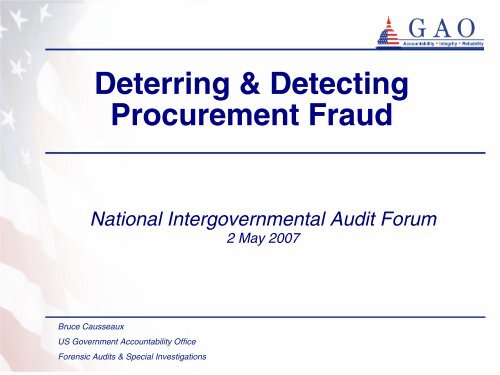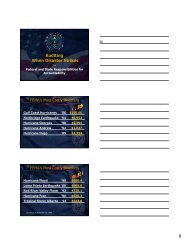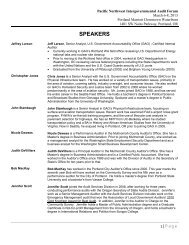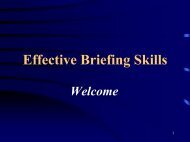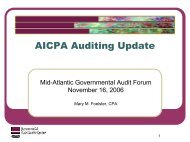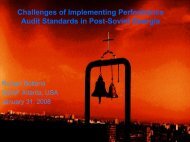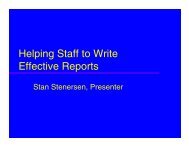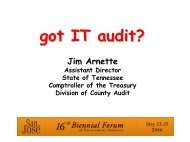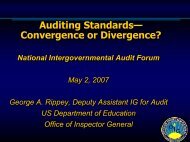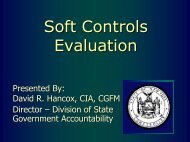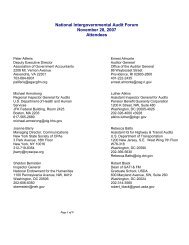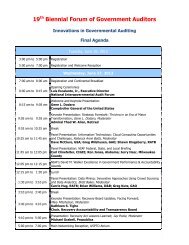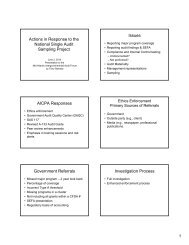Detecting & Deterring Fraud - Intergovernmental Audit Forums
Detecting & Deterring Fraud - Intergovernmental Audit Forums
Detecting & Deterring Fraud - Intergovernmental Audit Forums
- No tags were found...
You also want an ePaper? Increase the reach of your titles
YUMPU automatically turns print PDFs into web optimized ePapers that Google loves.
<strong>Fraud</strong> Definitions• <strong>Fraud</strong> –• Intentional use of deception• For unlawful gain• To deprive or injure another• Common Law Elements of <strong>Fraud</strong> –• False statement/omission of material fact• Intent/knowledge that it was false• Reliance by victim• Damages/detriment resulted• Occupational <strong>Fraud</strong> –• Use of one’s occupation for personalenrichment• Deliberate misuse/misapplication of employer’sresources/assets3
GAO Yellow Book• <strong>Fraud</strong> -- a type of illegal actinvolving the obtaining ofsomething of value throughwillful misrepresentation• Whether an act is, in fact, fraudis:• A determination to be madethrough the judicial or otheradjudicative system• Beyond auditors’professional responsibility4
<strong>Fraud</strong> 101• It is easier to deter fraud thandetect it• Fear of detection is thegreatest deterrent to fraud• Determining the total cost offraud is impossible; but whatis determinable is substantial5
<strong>Fraud</strong> Categories• Identity/Impersonation <strong>Fraud</strong>• Financial Statement <strong>Fraud</strong>• Healthcare <strong>Fraud</strong>• Medicaid & Medicare <strong>Fraud</strong>• Prescription Drug <strong>Fraud</strong>• Welfare <strong>Fraud</strong>• Social Security <strong>Fraud</strong>• Insurance <strong>Fraud</strong>• Funeral & Cemetery <strong>Fraud</strong>• Body Parts <strong>Fraud</strong>• Consumer <strong>Fraud</strong>• Home Improvement <strong>Fraud</strong>• Bank & Securities <strong>Fraud</strong>• Letter of Credit <strong>Fraud</strong>• Telemarketing <strong>Fraud</strong>• Credit Card <strong>Fraud</strong>• Check <strong>Fraud</strong>• Bankruptcy <strong>Fraud</strong>6
<strong>Fraud</strong> Categories• Mail <strong>Fraud</strong>• Photo <strong>Fraud</strong>• Hedge Fund <strong>Fraud</strong>• Internet <strong>Fraud</strong>• Auction & eBay <strong>Fraud</strong>• Click <strong>Fraud</strong>• Cell Phone <strong>Fraud</strong>• Staged-Accident <strong>Fraud</strong>• Spanish Lottery <strong>Fraud</strong>• Celebrity Memorabilia <strong>Fraud</strong>• Moving Company <strong>Fraud</strong>• Marriage <strong>Fraud</strong>• Adoption <strong>Fraud</strong>• Timesheet <strong>Fraud</strong>• Hurricane Katrina <strong>Fraud</strong>• Email & Phish <strong>Fraud</strong>• Mass Marketing <strong>Fraud</strong>• Corporate <strong>Fraud</strong>7
<strong>Fraud</strong> Categories• Workers Compensation <strong>Fraud</strong>• Grant <strong>Fraud</strong>• Election & Voter <strong>Fraud</strong>• Mortgage <strong>Fraud</strong>• Resume <strong>Fraud</strong>• Nigerian Letter/419 <strong>Fraud</strong>• Odometer <strong>Fraud</strong>• Customs <strong>Fraud</strong>• Cyber <strong>Fraud</strong>• Real Estate <strong>Fraud</strong>• Tax <strong>Fraud</strong>• Timeshare <strong>Fraud</strong>• Paternity <strong>Fraud</strong>• Affinity <strong>Fraud</strong>• Art <strong>Fraud</strong>• Journalistic <strong>Fraud</strong>• Contract & Procurement<strong>Fraud</strong>8
<strong>Fraud</strong> Theories• Job dissatisfaction is a primary cause of employeetheft• About 33 percent of employees admit to theft• Crime can be direct result of frustration/anger• Inability to achieve social & financial success• Mid-life crises• Criminal behavior is a choice• Long-serving, male executives most likely tocommit company fraud• Younger employees are not as honest as pastgenerations9
<strong>Fraud</strong> Theories• General drop in overall crime rate as persons age• <strong>Fraud</strong> works in reverse – aging increases thelikelihood of committing fraud• Most procurement fraud involves an “insider”(employee) of buying activity as well as an “outsider”(contractor)• Relatively few cases of women found to commitprocurement fraud• More honest/less greedy or just better at hiding it• Most fraudsters are in their mid-40s (average age 46)• Average Government employee is 46 years old10
<strong>Fraud</strong>ster Motives & ProfileMotives• Greed/lavish lifestyle• Gambling• Need/unforeseencircumstances• Debt• Drugs• Divorce/maritalproblemsProfile•Male• Mid-40s• Management orEmployee• Expensive Lifestyle• Low Moral Standards• Spend Their Proceeds11
Association of Certified <strong>Fraud</strong> ExaminersThe typical organizationloses 5% of its annualrevenues to occupationalfraud5% of the 2006 US GrossDomestic Product equatesto roughly $652 Billion12
<strong>Fraud</strong> Detection MethodsTip34.2%39.7%By Accident16%25.4%GovernmentDetection MethodInternal <strong>Audit</strong>Internal Controls20.5%20.2%19.9%19.2%All CasesExternal <strong>Audit</strong>15.4%12%Notified by Police7.1%3.8%0 5 10 15 20 25 30 35 40 45Percent of Cases13
Faces of <strong>Fraud</strong>Convicted or Accused14
Section II: Procurement“I have never yet found a contractor who, if not watched,would not leave the government holding the bag.”– Harry S. Truman
Federal Procurement Data System –Next GenerationContract Actions by Quarter16
Federal Procurement Data System –Next GenerationContract Dollars by Quarter17
Contract Actions by Dollar Value(Source: FPDS-NG Data for FY 2005)Number of ActionsSum of Dollars13%8% 2% $1M3% 4%16%77%77%Total Actions: 2,751,207Total Dollars: $376.4 Billion18
DoD Spending• 1,500 Weapon Acquisition Programs• Estimated life-cycle cost -- $2,200,000,000,000• On an average working day:• 25,000 contract actions -- $923,000,000• 195,000 credit card transactions -- $43,900,00019
DoD Contract Obligations & Workforce SizeFYs 2000-200520
Contract Award Example(14 March 2007)• Five companies were awarded a $350,000,000 firm-fixed-price, 5-year, time &material, cost reimbursable & fixed-price-award fee contract to provide nonpersonal,multi-functional, advisory & assistance services support at variousorganizations covering the breadth of acquisition & sustainment supportrequirements including:•Program management•Administrative management•Data management•Facilitation•Training•Financial management• Logistics• Contracting• Government property• Engineering• Manufacturing• Subject matter expert support• Individual Task Orders will range from supporting any phase of procurement &sustainment of systems, subsystems, components & equipment to supportingbase-wide staff activity. At this time, $32,747,250 has been obligated. Thiswork will be complete February 2013.21
Procurement PerspectivesPublic• Taxpayers• Mission• Public Interest• Socio-economicPrograms & Goals• Defense/HomelandSecurity/Environment• Bribes & Kickbacks• OversightPrivate• Stockholders• Profit• Bottom Line• Future Business, MarketShare & Growth• CorporateInterests/Image• Incentives & Rewards• Trust22
The New York Times – February 4, 2007“In Washington, Contractors Take On Biggest Role Ever”• “One of the side benefits of the contracting officers being sooverwhelmed was that existing contracts were extended rather thanput up for new competitive bidding.”– Federal Contractor• “Billions of dollars are being squandered, and the taxpayer is beingtaken to the cleaners.”– Henry A. Waxman, Chairman House Committee on Oversight &Government Reform• “There’s something civil servants have that the private sectordoesn’t. And that is the duty of loyalty to the greater good – theduty of loyalty to the collective best interest of all rather than theinterest of a few. Companies have duties of loyalty to theirshareholders, not to the country.”– David Walker, Comptroller General of the United States23
The New York Times – February 4, 2007“In Washington, Contractors Take On Biggest Role Ever”• “I don’t think the system is fundamentally broken – It’s remarkablehow well it works, given the dollar volume.”– Stan Soloway, President of the Professional Services Council• “To us contractors, money is always a good thing.”– Joe Haddock, Executive – Sikorsky Helicopters• “We have no data to show that contractors are actually moreefficient than the government.”– Paul C. Light, New York University24
The Washington Post – April 4, 2007“The IG Ideology” by Steve Kelman• IGs accomplish useful work• Most IG reports favor punishment, not reward• IGs focus on controls, not creativity• IG reports often shout about problems but are silent aboutaccomplishments• Many IGs also advocate extreme distrust of contractors• Goes beyond prudent protection of government interests• Ignores lessons from business where information sharing acrossorganizational boundaries promotes good contractual performance• In government contracting, IG culture has undermined publicmanagement & that is bad for good government• IGs do good work25
Competing Challenges & Risks• Increased Procurements• Services vs Equipment/Hardware• Decreased Acquisition Workforce• Planning, Administration & Oversight• Acquisition Streamlining• Expediency vs Controls• Interagency Contracting• Performance Metrics vs Buyer Requirements26
Competing Challenges & Risks• Partnering with Contractors• Mission vs Profit• Organizational Conflicts of Interest• Firewalls vs Information Exchange• Revolving Door• Personal Conflict of Interest vs Opportunity• Inherently Governmental Functions• Personal vs Non-personal Services• Blurred Lines of Responsibility• Blended Workforce27
Competing Challenges & Risks• Small Business Opportunities & Goals• Certification vs Representation vs Verification• Maintaining Industrial Base vs Best Value• Appropriation Limitations• Use it or Lose it• Color of Money• Consistency & Clarity of Regulations & Policies• Interpretation of Spirit & Intent• Right to Access vs Right to Privacy• Freedom of Information vs Sensitive Data Protection28
Competing Challenges & Risks• Industry & Management Resistance• Trust vs Verify• Coordination of <strong>Audit</strong>, Investigation & Legal Staffs• Stovepipes vs Common Goals• Civil vs Criminal Prosecution• Resources vs Value of <strong>Fraud</strong> Deterrence• Measuring Return on Investment• Incentive to Detect vs Protect• Adverse Publicity vs Accountability & Recoupment ofLoss29
Competing Challenges & Risks• National Emergencies• Post 9/11 & War on Terrorism• Natural Disasters (Katrina)• Pressure to Obligate vs Obligation to be Prudent• Need vs Greed vs Speed• Opportunists vs Truly Deserving• War & Disaster Profiteering• Carpetbaggers30
GAO ReportContract Management: DoD Vulnerabilities to Contracting <strong>Fraud</strong>, Waste, &Abuse (7 July 2006)• DoD faces vulnerabilities to contractingfraud, waste, & abuse due to weaknesses infive key areas:• Sustained senior leadership• Capable acquisition workforce• Adequate pricing• Appropriate contracting approaches &techniques• Sufficient contract surveillance31
Dollars, Not Sense:Government Contracting• June 2006 – House Committee on GovernmentReform – Minority Staff, Special InvestigationsDivision• Award of noncompetitive contracts increasing• Reliance on abuse-prone contract types increasing• Abuse of contract flexibilities is common• Poor contract planning is recurring problem• Inadequate contract oversight• <strong>Audit</strong>or findings are disregarded & contractor performanceignored in fee awards• Corruption appears to be growing32
Faith-based ContractingA procurement process whereby thegovernment essentially hopes & prays that thecontractor does not rip them off too badly
QuestionsBruce Causseaux202-512-2905causseauxb@gao.gov


